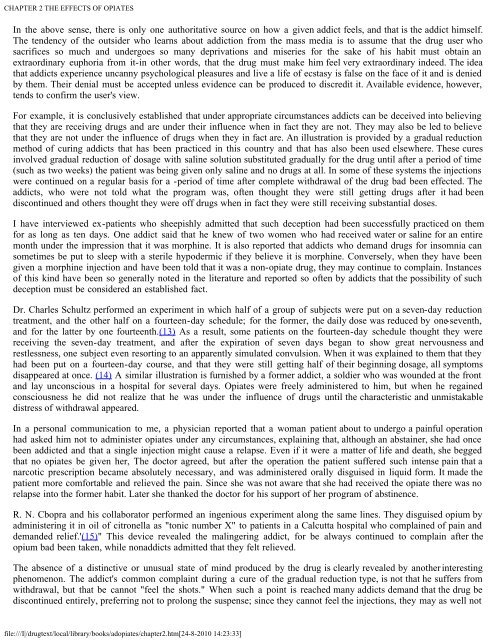Addiction and Opiates
Addiction and Opiates
Addiction and Opiates
Create successful ePaper yourself
Turn your PDF publications into a flip-book with our unique Google optimized e-Paper software.
CHAPTER 2 THE EFFECTS OF OPIATES<br />
In the above sense, there is only one authoritative source on how a given addict feels, <strong>and</strong> that is the addict himself.<br />
The tendency of the outsider who learns about addiction from the mass media is to assume that the drug user who<br />
sacrifices so much <strong>and</strong> undergoes so many deprivations <strong>and</strong> miseries for the sake of his habit must obtain an<br />
extraordinary euphoria from it-in other words, that the drug must make him feel very extraordinary indeed. The idea<br />
that addicts experience uncanny psychological pleasures <strong>and</strong> live a life of ecstasy is false on the face of it <strong>and</strong> is denied<br />
by them. Their denial must be accepted unless evidence can be produced to discredit it. Available evidence, however,<br />
tends to confirm the user's view.<br />
For example, it is conclusively established that under appropriate circumstances addicts can be deceived into believing<br />
that they are receiving drugs <strong>and</strong> are under their influence when in fact they are not. They may also be led to believe<br />
that they are not under the influence of drugs when they in fact are. An illustration is provided by a gradual reduction<br />
method of curing addicts that has been practiced in this country <strong>and</strong> that has also been used elsewhere. These cures<br />
involved gradual reduction of dosage with saline solution substituted gradually for the drug until after a period of time<br />
(such as two weeks) the patient was being given only saline <strong>and</strong> no drugs at all. In some of these systems the injections<br />
were continued on a regular basis for a -period of time after complete withdrawal of the drug bad been effected. The<br />
addicts, who were not told what the program was, often thought they were still getting drugs after it had been<br />
discontinued <strong>and</strong> others thought they were off drugs when in fact they were still receiving substantial doses.<br />
I have interviewed ex-patients who sheepishly admitted that such deception had been successfully practiced on them<br />
for as long as ten days. One addict said that he knew of two women who had received water or saline for an entire<br />
month under the impression that it was morphine. It is also reported that addicts who dem<strong>and</strong> drugs for insomnia can<br />
sometimes be put to sleep with a sterile hypodermic if they believe it is morphine. Conversely, when they have been<br />
given a morphine injection <strong>and</strong> have been told that it was a non-opiate drug, they may continue to complain. Instances<br />
of this kind have been so generally noted in the literature <strong>and</strong> reported so often by addicts that the possibility of such<br />
deception must be considered an established fact.<br />
Dr. Charles Schultz performed an experiment in which half of a group of subjects were put on a seven-day reduction<br />
treatment, <strong>and</strong> the other half on a fourteen-day schedule; for the former, the daily dose was reduced by one-seventh,<br />
<strong>and</strong> for the latter by one fourteenth.(13) As a result, some patients on the fourteen-day schedule thought they were<br />
receiving the seven-day treatment, <strong>and</strong> after the expiration of seven days began to show great nervousness <strong>and</strong><br />
restlessness, one subject even resorting to an apparently simulated convulsion. When it was explained to them that they<br />
had been put on a fourteen-day course, <strong>and</strong> that they were still getting half of their beginning dosage, all symptoms<br />
disappeared at once. (14) A similar illustration is furnished by a former addict, a soldier who was wounded at the front<br />
<strong>and</strong> lay unconscious in a hospital for several days. <strong>Opiates</strong> were freely administered to him, but when he regained<br />
consciousness he did not realize that he was under the influence of drugs until the characteristic <strong>and</strong> unmistakable<br />
distress of withdrawal appeared.<br />
In a personal communication to me, a physician reported that a woman patient about to undergo a painful operation<br />
had asked him not to administer opiates under any circumstances, explaining that, although an abstainer, she had once<br />
been addicted <strong>and</strong> that a single injection might cause a relapse. Even if it were a matter of life <strong>and</strong> death, she begged<br />
that no opiates be given her, The doctor agreed, but after the operation the patient suffered such intense pain that a<br />
narcotic prescription became absolutely necessary, <strong>and</strong> was administered orally disguised in liquid form. It made the<br />
patient more comfortable <strong>and</strong> relieved the pain. Since she was not aware that she had received the opiate there was no<br />
relapse into the former habit. Later she thanked the doctor for his support of her program of abstinence.<br />
R. N. Cbopra <strong>and</strong> his collaborator performed an ingenious experiment along the same lines. They disguised opium by<br />
administering it in oil of citronella as "tonic number X" to patients in a Calcutta hospital who complained of pain <strong>and</strong><br />
dem<strong>and</strong>ed relief.'(15)" This device revealed the malingering addict, for be always continued to complain after the<br />
opium bad been taken, while nonaddicts admitted that they felt relieved.<br />
The absence of a distinctive or unusual state of mind produced by the drug is clearly revealed by another interesting<br />
phenomenon. The addict's common complaint during a cure of the gradual reduction type, is not that he suffers from<br />
withdrawal, but that be cannot "feel the shots." When such a point is reached many addicts dem<strong>and</strong> that the drug be<br />
discontinued entirely, preferring not to prolong the suspense; since they cannot feel the injections, they may as well not<br />
file:///I|/drugtext/local/library/books/adopiates/chapter2.htm[24-8-2010 14:23:33]





